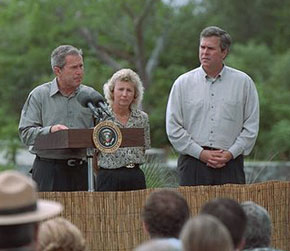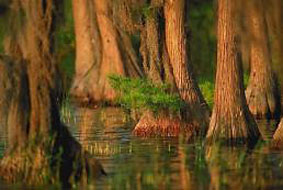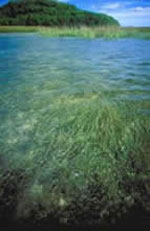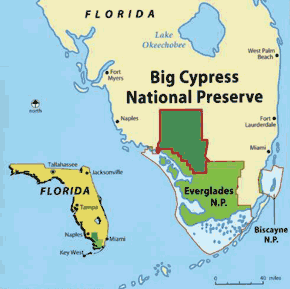How Green Goes the Sunshine State
Air Date: Week of September 3, 2004
Could green issues decide the presidential race in Florida? Some environmental and Democratic groups think so and are waging major campaigns aimed at conservation-minded voters. Living on Earth’s Jeff Young looks at the issues that have gained political traction, from the plight of the Everglades to the threat of coastal oil drilling.
Transcript
CURWOOD: It’s Living on Earth. I’m Steve Curwood. Remember hanging chads? The 36-day recount? How could we forget? Anyone who watched the last presidential election knows how important Florida can be in picking our president. The U.S. Supreme Court ultimately declared George W. Bush the winner with a margin in the neighborhood of 500 votes in Florida, a state in which more than 90,000 votes were cast for Ralph Nader. Arguably, many of those votes for Mr. Nader express dissatisfaction with the environmental positions of the Clinton administration and Democratic nominee Al Gore. This time, voters in this key swing state may take out their frustrations with federal environmental policies on the Republicans. Living on Earth’s Jeff Young has our report.
[SURF SOUND UP & UNDER]
YOUNG: Floridians love the outdoors. If they’re not enjoying the beaches, lakes or that giant river of grass called the Everglades, they’re making money from visitors who are. Tourism means Florida’s environment is closely tied to its economy and its politics…
[SURF SOUND FADES OUT]
YOUNG: …which might explain why President Bush visited Florida just after Earth Day this April to promote his wetlands program from the edge of the Everglades.
BUSH: For years, our nation has sought to slow the loss of wetlands. Now I believe we must change that goal to one that says we’ll have an overall increase in wetlands every year. Instead of just reducing loss, the goal of this country must be to increase wetlands. [APPLAUSE]
 As his brother, Florida Governor Jeb Bush stands by his side, President George W. Bush speaks at the Royal Palm Visitors Center at Everglades National Park, FL. (Photo: White House photo by Eric Draper)
As his brother, Florida Governor Jeb Bush stands by his side, President George W. Bush speaks at the Royal Palm Visitors Center at Everglades National Park, FL. (Photo: White House photo by Eric Draper)
[AIRBOAT STARTING UP, ENGINE UNDER]
YOUNG: Gene Duncan guides his airboat through the sawgrass sloughs and hardwood hammocks of part of the Everglades the Miccosukee Indians call home. Duncan is chief of water resources for the Miccosukee tribe and he’s on the lookout for signs of trouble. To the novice eye, trouble seems a world away. Sawgrass sways in our wake and pure white egrets dot the brilliant blue sky and glassy water.
[SOUND OF ENGINE CUTTING OFF]
YOUNG: But Duncan sees subtle changes in vegetation that hint at much larger problems with water quality.
DUNCAN: If you kill off the microorganisms and you kill off the algae, they get replaced with more pollution-tolerant species. And some of those species consume oxygen rather than produce oxygen, so when we start messing around with the stuff at the bottom end you see big changes at the top end.
[INSECT SOUNDS]
YOUNG: Four years ago, Congress approved a nearly $8 billion project to restore a more natural flow of Everglades water that is now lost to dikes, dams and ditches. Everglades restoration also means reducing water pollution from urban and agricultural areas, especially the high nutrient levels that Duncan monitors. There’s been progress, but Duncan says it’s come slowly and often only after the tribe and environmental groups filed lawsuits. He’s especially frustrated that the government has postponed by up to a decade deadlines for meeting water quality standards.
DUNCAN: Actions speak louder than words. Saying you support the Everglades is not doing the right thing. So we’ve got all these people getting elected saying that they support the Everglades, but in reality they turn around and pass laws that push the dates for Everglades compliance back further and further and further. So just saying you’re for the Everglades isn’t good enough. You have to actually do it.
|
|
|
|
|
Images of the Florida Everglades (Photo: Courtesy of The South Florida Water Management District) |
YOUNG: Conservation groups focusing on the Everglades say the Bush administration is doing very little. REINER: It couldn’t get any worse. Let me just put it that way. YOUNG: That’s Miami attorney David Reiner, president of Friends of the Everglades. REINER: Right now we’re at a low as far as federal oversight of restoration and the environment in South Florida, it really can’t get worse than it is right now. YOUNG: Reiner blames not one but two Bush administrations: the one in the White House and the one in Tallahassee, where the president’s brother, Jeb, is governor. Reiner says federal agencies overseeing state environmental programs seem reluctant to take action in Florida. REINER: There is automatically a hotline, per se -- a bat line, if you will -- between Tallahasee and Washington. If the federal government, who is really the chief overseer of the national pollution laws-- Clean Water Act, Endangered Species Act, and so forth—if they start to lean too heavily on the state, then the phone gets picked up in Tallahassee, a phone call is made to Washington, and suddenly the agencies back off. And that’s not good for the environment in South Florida. YOUNG: Reiner says he saw this in action this year when his group and the Miccosukee filed a lawsuit that went to the U.S. Supreme Court. Reiner and the tribe challenged a pumping station that sent untreated stormwater straight into the Everglades. They thought federal agencies supported their argument that the station should be regulated and made to treat the water. But when the case reached the Supreme Court, the Bush administration’s top lawyer argued the polluter’s side instead. REINER: When it came time to argue the case it was clear that the EPA had changed their direction 180 degrees. Now they were arguing against us, and we’re only left guessing it was probably pressure from Tallahassee to Washington that caused that to happen. YOUNG: Friends of the Everglades and the Miccosukee are again suing the Bush administration over delays in water quality targets. But is a legal battle over Everglades water something Florida voters know or care enough about to become an issue in the presidential campaign? The Miccosukee hope it will in at least in one venue: the presidential debate they’re sponsoring September 30th at the University of Miami. And they’re not the only ones making sure Florida voters know about environmental issues. [KNOCKING ON DOOR, INTRODUCTIONS] YOUNG: These canvassers are part of the Sierra Club’s environmental voter education effort in the Tampa Bay area. The Sierra Club, League of Conservation Voters and a Democratic group called Environment 2004 are pumping somewhere around one and a half million dollars into door-to-door, direct mail and advertising campaigns on the Bush environmental record. They’ve focused on the stretch of Interstate 4 from Orlando to Tampa Bay – an area where the Sierra Club’s Darden Rice says the most undecided voters are up for grabs. RICE: I think you could definitely say that the I-4 corridor is the battleground of the battleground state, so it doesn’t hurt that we’re doing these efforts here. YOUNG: Rice says people are friendly and interested, even if her knock at the door interrupts dinner. She says people especially want to know about threats to the water they live by, drink and fish. RICE: In Florida clean water issues are the biggie. People move here because they love to go to the beach, or, even if you live in middle of the state, you love to go canoeing down a pretty spring or a pretty river. It also has to do with the quality of the water that comes out of the spigot in the kitchen sink. So water issues in terms of quality and quantity are things that really strike us at home here in the Tampa Bay area. YOUNG: Mercury pollution is a rising concern here. Mercury is a neuro-toxin that goes from air sources to water and then into people through fish. The state now has fish consumption advisories on nearly all its coastal waters and many of its lakes and rivers. Mercury is especially dangerous to pregnant and nursing women, and the issue hits home for Tampa resident Ann Vanek-Dasovich, whose son, Jeffrey, is going on 11 months. [SOUND OF BABY TALK] DASOVICH: I was at my first ob-gyn appointment and was told by my doctor when they found out that I was a fisherman and we eat fish a lot. We think that’s really healthy and that that’s good for us. Unfortunately, she said not to eat any more fish while I was pregnant because of the high mercury counts, and that I was putting my child at risk. And that was pretty stunning news. YOUNG: Dasovich lives on Davis Island in Tampa Bay, where she and her husband fish nearly every weekend. DASOVICH: (OUTDOORS) That marker out there we catch a lot of bait fish, out there greenbacks. And then, well, obviously the power plant you can see the distance we do go around that end and go out there to fish. YOUNG: She points out the smokestacks of a coal-fired power plant partly responsible for the mercury in the bay and its fish. Dasovich is upset that the Bush administration is not doing more to make power companies cut their mercury pollution. DASOVICH: What I put in my body was affecting my child. Because it became so personal to me, my eyes were opened. I was able to make connections that I couldn’t make before, and how those issues affect who I vote for. So that’s become an issue that’s very near and dear to my heart. YOUNG: The debate on mercury regulation is complex. The administration says it will cut mercury from power plants for the first time with a market-friendly, cap-and-trade proposal that spurs innovative pollution reductions. Critics say the Bush proposal violates the Clean Air Act by not making mercury cuts soon enough or deep enough. Miami native Carol Browner led the EPA under President Clinton and now works with the Democratic group Environment 2004. She thinks Floridians will see the mercury issue as proof that Bush favors the power industry over public health. BROWNER: I think on the issue of mercury the Bush administration has been so publicly bad, so unwilling to require the utilities to reduce their mercury emissions--which is completely doable– that increasingly voters in Florida and across the country see this as an issue that where you stand is clear. YOUNG: But when it comes to getting Floridians really worked up, no issue comes close to that of putting oil rigs off the state’s Gulf coast. WILKERSON: That’s not what anybody envisions when they come down for their big two-week Florida vacation every year. [SURF SOUNDS UNDER TRACK] YOUNG: That’s Mary Wilkerson, who rents vacation homes along the Gulf beaches near Tampa. She was president of the local chamber of commerce and is generally mild mannered, until talk turns to the potential threat of oil spills from offshore drilling.
YOUNG: The Bush administration did think about it, and in a 2001 energy plan proposed drilling some six million acres of the Gulf. But when nearly every elected official in Florida – including Jeb Bush – protested, President Bush compromised. He bought back some oil and gas drilling rights from companies and pushed drilling at least 200 miles from the Florida coast. That announcement in 2001 was widely applauded, even by some environmentalists. But some political observers wonder if Bush’s commitment will hold. Patrick Mantiega is editor and publisher of a small but influential Tampa newspaper, La Gaceta. MANTIEGA: Well, I think he did what he felt he had to politically. The question is, is he going to continue to act that way when his brother is no longer up for re-election in the state of Florida, and when he’s not seeking reelection for the presidency? YOUNG: Indeed, the issue resurfaced later in the president’s term. The administration’s energy bill last year included a Gulf drilling provision that opponents called a step back on the slippery slope toward drilling along Florida’s coast. Wilkerson and others closely tied to the tourism business say Gulf drilling could become a voting issue. WILKERSON: It has to be clearly spelled out. They have to clearly say, “No, we will not jeopardize the state of Florida’s pristine coastal environment with oil drilling.” It just has to be clearly spelled out. And if it is, I know for a fact it will, it will persuade people to vote. It absolutely will. YOUNG: Some Florida Republicans fear Bush’s environmental record could cost him support in the state, not just among undecided voters, but within the party itself. Joan Deguire leads the Florida chapter of Republicans for Environmental Protection. DEGUIRE: I think it’s weakening the base. I’ve met a great many people in the public who have left the Republican party. They may just be independents, but they have left the Republican party. They’re moderates, they are Republican in their attitude, but they care about the environment and they just can’t stand it anymore. It may cause them to lose the election. YOUNG: That’s not how most Florida Republicans see it though. Allison Defoor ran on an environmental platform for his spot as a delegate to the Republican National Convention. He says Bush’s record will play well in Florida. DEFOOR: I think in Florida he’s in good shape with the green voters. President Bush in Florida has been following his brother Jeb’s lead on oil drilling and on the Everglades, which are the two real hot button issues in our state politically. So I think he’s got a record to be proud of. YOUNG: Defoor is a former lieutenant governor who served as Everglades czar to Governor Bush in ‘99 and 2000. He says Everglades restoration has President Bush’s support. The Republican campaign platform even singles out the Everglades as an area of “special federal responsibility.” And while Defoor acknowledges that some in the White House might like to drill oil along Florida’s coast, the point is that they did not. DEFOOR: There are advocates within the administration for oil drilling in the Eastern Gulf. They have not prevailed. Policy arguments go on in any administration. Where it ended up is there’s not going to be any drilling and that’s fine. YOUNG: Beyond the specific issues, Defoor describes a Florida attitude about the environment that he says Bush’s critics don’t quite get. DEFOOR: I just don’t think you understand what’s really going on in Florida, perhaps, and that is that the environmental community and the business community have forged a broad consensus on a lot—not all—but a lot of issues and have been able to move the ball dramatically as a result of that consensus. I think in a political sense that’s what it boils down to. They’re gonna look at who’s getting it done and is there a case to be made to do it differently? And given the progress that we’ve had on the environment in Florida in the last eight years, I just don’t think the case has yet been articulated that would say, do something different. YOUNG: Democrats are betting they can make that case for the environment vote. As the 2000 election showed, even a few hundred votes can make the Sunshine State swing. For Living on Earth, I’m Jeff Young in Tampa, Florida. [MUSIC: Jimmy Buffett “Only Time Will Tell” JIMMY BUFFETT (MCA -- 1996) Links
|



 (Graphic: Bo King, UNC Charlotte Cartography Lab)
(Graphic: Bo King, UNC Charlotte Cartography Lab) 



